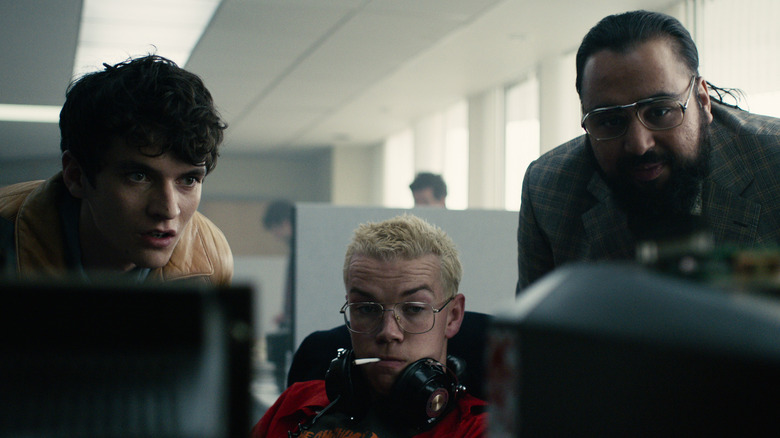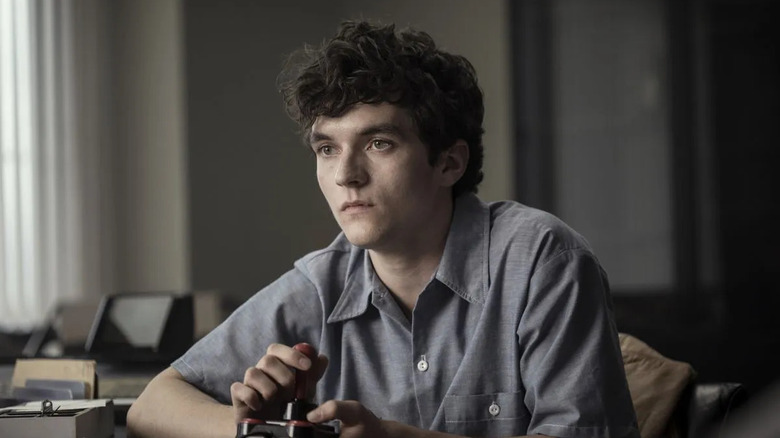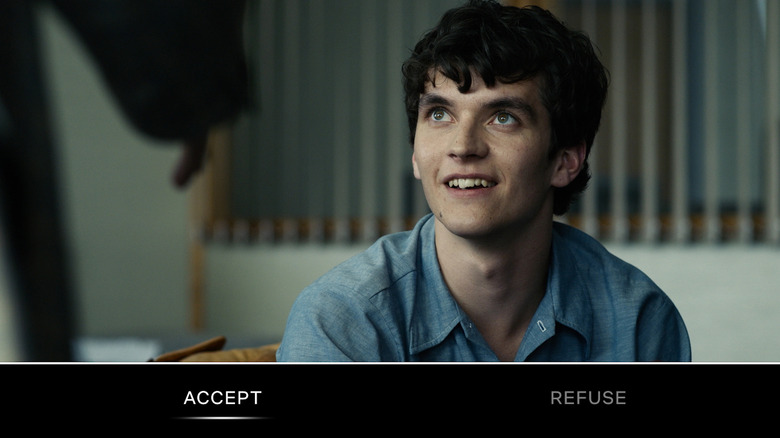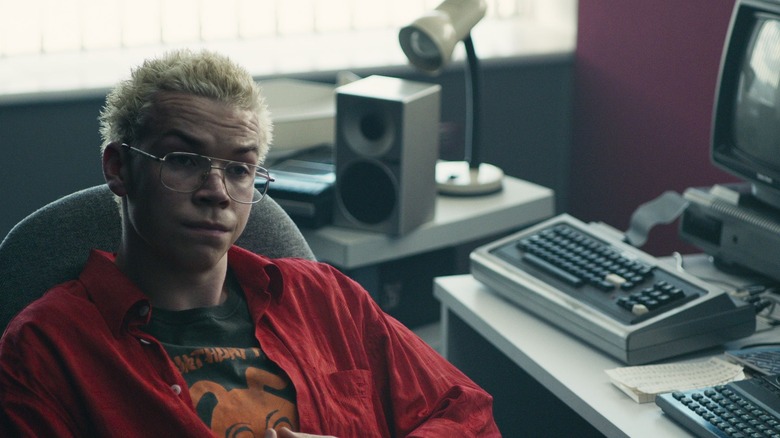Black Mirror's Creators Had Two Major Concerns Going Into Bandersnatch
Say what you will about "Black Mirror," but the show's never been complacent. Not content with creating one of the most popular anthology shows since "The Twilight Zone," showrunners Charlie Brooker and Annabel Jones decided to create a special episode that was completely unlike nearly anything else on TV. They made "Bandersnatch," an interactive episode where viewers got to choose the main character's actions for him. It turned watching the show into an active experience for the viewers, making us feel more like we were playing a video game than watching an episode of TV.
It's a creative choice the show has never done since, because as the episode itself unpacks, there are a lot of limits to this format. From a writing standpoint, after all, how do you write a compelling character when you can no longer use his choices to define him? Perhaps the bigger challenge is the question of how expansive the story could or should be. The episode apparently has over five hours of footage, but the average viewer will only see around 90 minutes of that on their first watch. It must be a little frustrating to basically be creating a movie where, by design, you know the viewer's going to miss most of it.
When creating the special episode, Brooker and Jones had two main concerns they were worried about: the main character's likeability, and whether they were effectively taking advantage of the format.
'I don't give a f*** about Mario'
One of the criticisms of the episode, which Charlie Brooker was actually happy to hear, was that viewers cared too much about the main character Stefan (Fionn Whitehead). After all, the young man was struggling with severe mental health issues, and he actively tried to resist many of the choices the audience picked for him. While some of the more sadistic viewers were more than happy to have Stefan throw his pills away and see what sort of chaos would happen next, many other viewers felt too protective of him to choose any of the more "exciting" options.
But although Brooker recalls people telling him, "'We just wanted to give him a happy ending!'" there are precious few happy endings available for Stefan. Most of your choices eventually result in him killing his dad and ending up in prison. But for Brooker, the fact that people wanted to get a happy ending at all was a good sign. As he said in a 2019 interview:
"Well, thank f*** you cared about Stefan. That was our biggest worry. I play computer games and I don't give a f*** about the people in them. I don't give a f*** about Mario because he's not really a character and he does whatever the f*** I tell him to."
Although video games can in fact make you care passionately about the characters in them (have you seen how hyped we are about "The Last of Us" adaptation?), that sort of empathy for the character's fate is something that the medium of TV/film tends to be better at achieving. The fact that "Bandersnatch" managed to keep the strengths of film, even while structuring the story more like a videogame, was a massive accomplishment.
A heavy contemplation on free will
As Jones explained, another big concern was essentially the question: Did the change in structure enhance the story they were telling, or was it just a cheap gimmick to draw in new viewers? As Jones put it, "Did we earn the right to use the interactive form? I think we did. Did we waste the form? We exposed it. We had fun with it."
As a whole, "Bandersnatch" was all about the illusion of free choice. Stefan is having a prolonged mental breakdown because he feels like there's someone else out there pulling the strings, that he has no control over his own actions. There are even one or two points in the game where he successfully refuses to do the thing you tell him to do. The character's struggle for sanity, his desire to be able to trust that the world around him is what it says it is, is basically the perfect fit for an interactive story.
Modern TV/film has a tendency to lean too hard into meta jokes at the expense of the story's emotional impact, but with "Bandersnatch," the meta nature is a large part of what gives the story its sense of stakes. Stefan knows that someone out there is controlling him, and that person is us. The episode's basically telling us that we're no better than the people manipulating Victoria in "White Bear." (Worse even, since Stefan hasn't committed any crimes yet.) It calls us out for thoughtlessly playing God with another person's life. It makes us feel guilty about putting him in harm's way.
They probably won't do this sort of thing again
Season 6 of "Black Mirror" is in production now, and will hopefully be released sometime in 2023. We don't know much about the individual episodes, except that the show's expected to be "even more cinematic in scope." That's saying something, considering how the past few seasons have already been pretty cinematic.
Although that willingness to try new things that led to "Bandersnatch" doesn't seem to have gone anywhere, it's unlikely the show will ever use that format again. As the special episode itself seems aware, there are a ton of writing limitations to the choose-your-own-adventure format, most notably how it makes creating a consistent character arc or thematic through-line nearly impossible. That's why their episode was one that analyzed the format itself and picked it apart for its strengths and weaknesses. Why would the showrunners want to return to a format that they've already done pretty much everything they could with?
There's also the problem that the episode was much, much harder to produce than a typical "Black Mirror" episode. When asked if he had any advice for people trying to make a similarly structured story, Charlie Brooker replied: "Run away. It's harder than you think."



